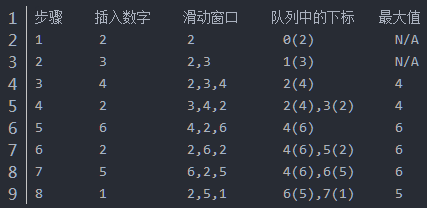1 Topic Description
2 Thoughts and Methods
(1) Use int max_number=*max_element (num.begin()+i, num.begin()+size+i); statement to find the maximum value, int count = num.size()-size+1; vector < int > result; result. push_back(max_number).
(2) a double-ended queue is used. The maximum value of the current window is saved at the first position of the queue when the window slides once. a. Judging whether the current maximum is invalid, that is, not in the sliding window; b. Comparing the newly added values from the end of the team, all the values smaller than him are discarded.

3 C++ core
(1)
1 class Solution { 2 public: 3 vector<int> maxInWindows(const vector<int>& num, unsigned int size) 4 { 5 int count = num.size()-size+1; 6 vector<int> result; 7 if(size==0 || num.size()==0){ 8 return result; 9 } 10 for(int i =0;i<count;i++){ 11 int max_number = *max_element(num.begin()+i,num.begin()+size+i); 12 result.push_back(max_number); 13 } 14 return result; 15 } 16 };
(2)
1 class Solution { 2 public: 3 vector<int> maxInWindows(const vector<int>& num, unsigned int size) 4 { 5 vector<int> resu; 6 if (num.size() >= size && size >= 1) { 7 deque<int> numDeque; 8 //First of all, the former size Number pressed into two-way queue according to rules 9 for (int i = 0; i != size; i++) { 10 while (!numDeque.empty() && num[i] >= num[numDeque.back()]) { 11 numDeque.pop_back(); //When the data added later is larger than the data in the queue, the data in the queue pops up in turn. 12 } 13 numDeque.push_back(i); 14 } 15 //Press in the first maximum 16 //The maximum value of the sliding window always lies at the head of the bidirectional queue 17 resu.push_back(num[numDeque.front()]); 18 for (int i = size; i != num.size(); i++) { 19 //First press the new values according to the rules 20 while (!numDeque.empty() && num[i] >= num[numDeque.back()]) { 21 numDeque.pop_back(); //When the data added later is larger than the data in the queue, the data in the queue pops up in turn. 22 } 23 //And delete the old value, that is, the value of the window slides out. 24 if (!numDeque.empty() && numDeque.front() <= static_cast<int>(i - size)) { 25 numDeque.pop_front(); 26 } 27 numDeque.push_back(i); 28 resu.push_back(num[numDeque.front()]); 29 } 30 } 31 return resu; 32 } 33 };
4 C++ Complete Code
1 #include <iostream> 2 #include <vector> 3 #include <deque> 4 using namespace std; 5 vector<int> maxInWindows(const vector<int>& num, unsigned int size); 6 int main() { 7 vector<int> data{ 2, 3, 4, 2, 6, 2, 5, 1 }; 8 vector<int> resu = maxInWindows(data, 3); 9 for (auto a : resu) { 10 cout << a << endl; 11 } 12 system("pause"); 13 return 0; 14 } 15 vector<int> maxInWindows(const vector<int>& num, unsigned int size) { 16 vector<int> resu; 17 if (num.size() >= size && size >= 1) { 18 deque<int> numDeque; 19 //First of all, the former size Number pressed into two-way queue according to rules 20 for (int i = 0; i != size; i++) { 21 while (!numDeque.empty() && num[i] >= num[numDeque.back()]) { 22 numDeque.pop_back(); 23 } 24 numDeque.push_back(i); 25 } 26 //Press in the first maximum 27 //The maximum value of the sliding window always lies at the head of the bidirectional queue 28 resu.push_back(num[numDeque.front()]); 29 for (int i = size; i != num.size(); i++) { 30 //First press the new values according to the rules 31 while (!numDeque.empty() && num[i] >= num[numDeque.back()]) { 32 numDeque.pop_back(); 33 } 34 //And delete the old value, that is, the value of the window slides out. 35 if (!numDeque.empty() && numDeque.front() <= static_cast<int>(i - size)) { 36 numDeque.pop_front(); 37 } 38 numDeque.push_back(i); 39 resu.push_back(num[numDeque.front()]); 40 } 41 } 42 return resu; 43 }
Reference material
https://blog.csdn.net/u012477435/article/details/83351659#_1782(1)
https://blog.csdn.net/qq_43502142/article/details/87894236 (illustration)
https://blog.csdn.net/qq_37466121/article/details/88410390,https://blog.csdn.net/qq_43502142/article/details/87894236,https://blog.csdn.net/zjwreal/article/details/89295109(2)
https://blog.csdn.net/m0_37950361/article/details/82153147 (core code, complete code)
https://blog.csdn.net/qq_40788630/article/details/79662812 (queue-related knowledge points)
https://blog.csdn.net/lee371042/article/details/81135007 (summary of queues and priority queues)